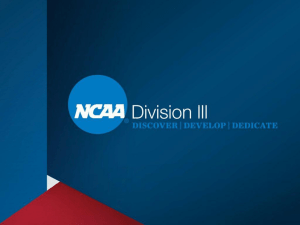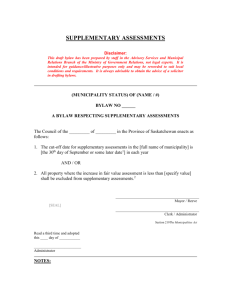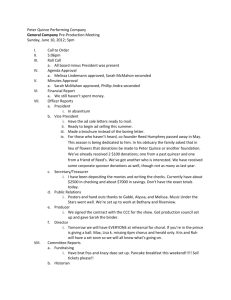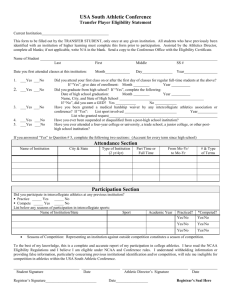Document
advertisement
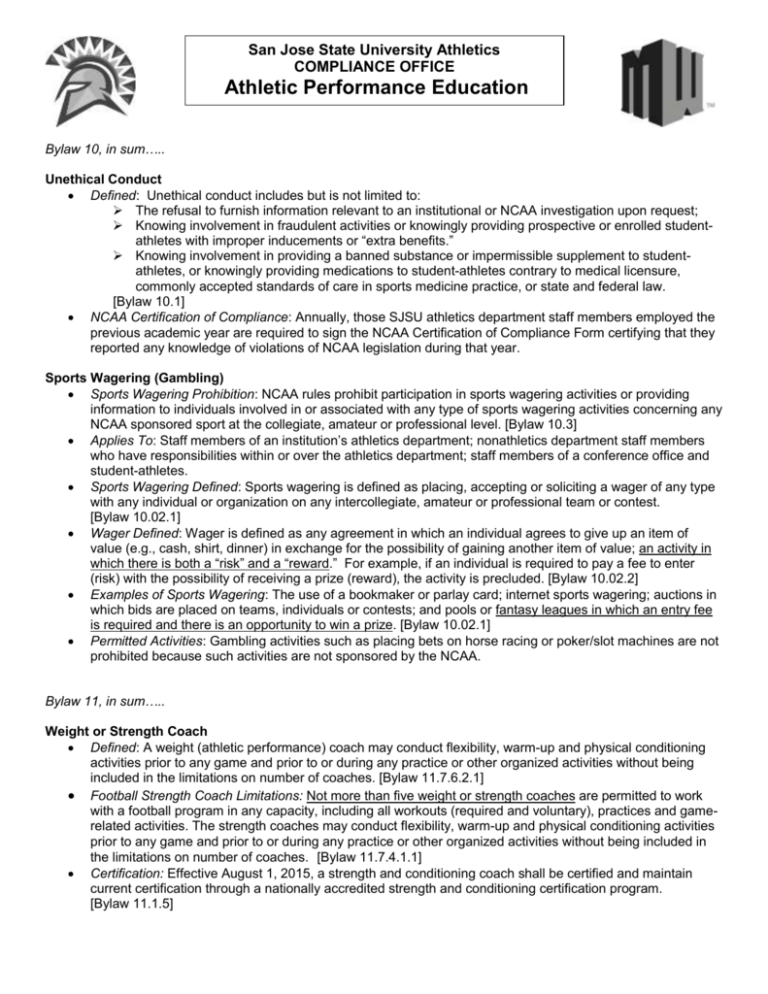
San Jose State University Athletics COMPLIANCE OFFICE Athletic Performance Education Bylaw 10, in sum….. Unethical Conduct Defined: Unethical conduct includes but is not limited to: The refusal to furnish information relevant to an institutional or NCAA investigation upon request; Knowing involvement in fraudulent activities or knowingly providing prospective or enrolled studentathletes with improper inducements or “extra benefits.” Knowing involvement in providing a banned substance or impermissible supplement to studentathletes, or knowingly providing medications to student-athletes contrary to medical licensure, commonly accepted standards of care in sports medicine practice, or state and federal law. [Bylaw 10.1] NCAA Certification of Compliance: Annually, those SJSU athletics department staff members employed the previous academic year are required to sign the NCAA Certification of Compliance Form certifying that they reported any knowledge of violations of NCAA legislation during that year. Sports Wagering (Gambling) Sports Wagering Prohibition: NCAA rules prohibit participation in sports wagering activities or providing information to individuals involved in or associated with any type of sports wagering activities concerning any NCAA sponsored sport at the collegiate, amateur or professional level. [Bylaw 10.3] Applies To: Staff members of an institution’s athletics department; nonathletics department staff members who have responsibilities within or over the athletics department; staff members of a conference office and student-athletes. Sports Wagering Defined: Sports wagering is defined as placing, accepting or soliciting a wager of any type with any individual or organization on any intercollegiate, amateur or professional team or contest. [Bylaw 10.02.1] Wager Defined: Wager is defined as any agreement in which an individual agrees to give up an item of value (e.g., cash, shirt, dinner) in exchange for the possibility of gaining another item of value; an activity in which there is both a “risk” and a “reward.” For example, if an individual is required to pay a fee to enter (risk) with the possibility of receiving a prize (reward), the activity is precluded. [Bylaw 10.02.2] Examples of Sports Wagering: The use of a bookmaker or parlay card; internet sports wagering; auctions in which bids are placed on teams, individuals or contests; and pools or fantasy leagues in which an entry fee is required and there is an opportunity to win a prize. [Bylaw 10.02.1] Permitted Activities: Gambling activities such as placing bets on horse racing or poker/slot machines are not prohibited because such activities are not sponsored by the NCAA. Bylaw 11, in sum….. Weight or Strength Coach Defined: A weight (athletic performance) coach may conduct flexibility, warm-up and physical conditioning activities prior to any game and prior to or during any practice or other organized activities without being included in the limitations on number of coaches. [Bylaw 11.7.6.2.1] Football Strength Coach Limitations: Not more than five weight or strength coaches are permitted to work with a football program in any capacity, including all workouts (required and voluntary), practices and gamerelated activities. The strength coaches may conduct flexibility, warm-up and physical conditioning activities prior to any game and prior to or during any practice or other organized activities without being included in the limitations on number of coaches. [Bylaw 11.7.4.1.1] Certification: Effective August 1, 2015, a strength and conditioning coach shall be certified and maintain current certification through a nationally accredited strength and conditioning certification program. [Bylaw 11.1.5] SJSU Athletics Compliance Athletic Performance Education Page 2 of 7 _________ Bylaw 13, in sum….. Prospect Defined: An individual who has started classes for the ninth grade. An individual remains a prospect until one of the following occurs: (a) The individual enrolls full-time and attends classes in any term of a four-year institution during the regular academic year; (b) The individual participates in a regular squad practice or competition at a four-year institution that occurs before the beginning of any term; (c) The individual officially registers, enrolls and attends classes during the summer term prior to initial full-time enrollment at SJSU; or (d) The individual reports to an orientation session within 14 days prior to classes of a regular academic term. [Bylaw 13.02.12] Off-Campus Contacts with Prospects Only those coaches permitted to recruit off campus may contact or evaluate prospects off campus. Institutional staff members (e.g., faculty members, athletics staff members) may contact prospects for recruiting purposes in all sports, on campus, or within 30 miles of campus during the prospect's official visit. [Bylaw 13.1.2.5] Exception: A noncoaching staff member with sport-specific responsibilities (except a staff member who only performs clerical duties) shall not attend an on- or off-campus athletics event in the staff member's sport that involves prospects (e.g., high school contest, noninstitutional sports camp) unless the staff member is an immediate family member or legal guardian of a participant in the activity subject to the following conditions: i. Attendance shall not be for evaluation purposes (the staff member shall not provide information related to the performance of a prospect back to the institution's coaching staff); and ii. The staff member shall not have direct contact with a prospect or a prospect's parent (or legal guardian) or coach (other than the immediate family member, if applicable) participating in the activity. [Bylaw 13.1.2.3(a)] Communication with Prospects Telephone Calls: A noncoaching institutional staff member or a coach who does not count toward the numerical limitations on head and assistant coaches may make phone calls to or receive phone calls from a prospect (or the prospect's relatives or legal guardians) beginning the calendar day after one of the following occurs: (a) The prospect signs a National Letter of Intent (NLI) and/or Grant-in-Aid (GIA); or (b) The institution receives a financial deposit (Orientation deposit at SJSU). [Bylaws 11.7.2 & 13.1.3.4.1] Pre-Enrollment Materials: An institution may provide any necessary pre-enrollment information (that is not otherwise considered to be general information related to an institution or its athletics programs) regarding orientation, conditioning, academics and practice activities in a video (or written) format (e.g., video playbook, games clips) to a prospect, provided he or she has signed an NLI or GIA, or has been officially accepted for enrollment. Permissible video or audio material may only be provided to a prospect via an electronic mail attachment or hyperlink. [Bylaw 13.4.1.7] Updated 6/3/15 SJSU Athletics Compliance Athletic Performance Education Page 3 of 7 _________ Tryout Activities A member institution on its campus or elsewhere, shall not conduct (or have conducted on its behalf) any physical activity (e.g., practice session or test/tryout) at which one or more prospects reveal, demonstrate or display their athletic abilities. [Bylaw 13.11.1] Permissible Tryouts for enrolled students must be approved by the Compliance Office. Final Tryout Approval will be provided via e-mail to the coaching staff and appropriate administrative staff. Students trying out for any SJSU team may NOT participate in practice activities until this final e-mail approval is received. A tryout may not last longer than 14 days! Basketball On-Campus Evaluations (OCE): In basketball, an institution may conduct an evaluation of a prospect on its campus or at a site at which it normally conducts practice or competition so long as the conditions set forth in Bylaw 13.11.2.1 are verified by the Compliance Office. Final OCE approval will be provided via e-mail to the coaching staff and appropriate administrative staff. Prospects may NOT participate in an OCE until this final e-mail approval is received. Outside Camp/Clinic Employment It is permissible for an institution's strength and conditioning coach to work at a camp/clinic that includes prospects, provided it meets the definition of a camp/clinic as outlined in Bylaw 13.12; however, if the camp/clinic is devoted to agility, flexibility, speed or strength tests, then it is NOT permissible for the institution's strength and conditioning coach to be employed at the camp/clinic. Basketball: An institution's coach or noncoaching staff member with responsibilities specific to basketball may be employed only at his/her institution's camps or clinics. Participation in such camps or clinics is limited to the months of June, July and August or any calendar week (Sunday through Saturday) that includes days of those months (e.g., May 28-June 3). It is not permissible for a basketball coach or a noncoaching staff member with responsibilities specific to basketball to be employed at other institutional camps or clinics or at noninstitutional privately owned camps or clinics. Football: An institution's coach or noncoaching staff member with responsibilities specific to football may be employed (either on a salaried or volunteer basis) in any capacity (e.g., counselor, guest lecturer, consultant) in a noninstitutional, privately owned camp or clinic at any location, provided the camp or clinic is operated in accordance with restrictions applicable to an institutional camp or clinic (e.g., open to any and all entrants, no free or reduced admission to or employment of athletics award winners). However, employment in such a camp or clinic is limited to two periods of 15 consecutive days in the months of June and July or any calendar week (Sunday through Saturday) that includes days of those months (e.g., May 28June 3). A Non-Institutional/Privately Owned Camp/Clinic Employment Form must be completed and submitted to the Compliance Office for approval by any coach intending to work a non-institutional or privately owned camp or clinic (not an SJSU Camp) at least two weeks prior to the start of the camp/clinic. This Form is located at sjsuspartans.com/Inside Athletics/Compliance/Forms & Policies/Bylaw 13/Camps/Clinics. Bylaw 14, in sum….. Eligibility Certification Student-athletes are NOT permitted to practice, compete, receive athletics aid, or be provided workout apparel or any other benefit related to athletics participation until they appear on the sport’s Eligibility Certification Roster as eligible for practice and/or competition. This Roster is distributed via email to each sport’s coaches and support staff prior to the first practice. Updates are provided as changes occur. Only the Associate Athletics Director for Compliance is permitted to clear student-athletes for practice and competition. [NCAA Bylaw 14.01.1] Updated 6/3/15 SJSU Athletics Compliance Athletic Performance Education Page 4 of 7 _________ Bylaw 16, in sum…. Extra Benefits Defined: An extra benefit is any special arrangement that provides a student-athlete or student-athlete’s family member or friend a benefit not expressly authorized by NCAA legislation or not generally available to the rest of the student body. [Bylaw 16.02.3] Receipt of a benefit by student-athletes or their family members or friends is not a violation of NCAA legislation if it is demonstrated that the same benefit is generally available to the institution's students or their family members or friends. [Bylaw 16.02.3] Receipt of any extra benefit jeopardizes a student-athlete’s athletic eligibility and must be reported to the Athletic Director or Compliance Office. Institutional Snacks An institution may provide snacks (including fruit, nuts and bagels) to student-athletes as a benefit incidental to participation. [Bylaw 16.5.2(d)] Nutritional Supplements [5/23/05, Ed. Column] An institution may provide only nonmuscle-building nutritional supplements to a student-athlete at any time for the purpose of providing additional calories and electrolytes, provided the supplements do not contain any NCAA banned substances. Permissible nonmuscle-building nutritional supplements are identified according to the following classes: Carbohydrate/electrolyte drinks, energy bars, carbohydrate boosters and vitamins and minerals. It is not permissible for an institution to provide any nutritional supplement/ingredients to its student-athletes, unless the supplement/ingredient is a nonmuscle-building supplement and is included in one of the aforementioned four classes. The list below is not exhaustive but should assist institutions in determining the types of nutritional supplements/ingredients that may be provided to student-athletes. Permissible Vitamins and minerals Energy bars Calorie replacement drinks (e.g., Ensure, Boost) Electrolyte replacement drinks (e.g., Gatorade, Powerade) * It is permissible for an institution to provide Glucosamine and/or Chondroitin to a student-athlete for medical purposes, provided such substances are provided by a licensed medical doctor to treat a specific, diagnosed medical condition (as opposed to prescribing them for preventive reasons). ** Glycerine or glycerol as a binding ingredient in a supplement product is permissible. Nonpermissible Amino Acids (including amino acid chelates) Chondroitin* Chrysin CLA (Conjugated Linoleic Acid) Creatine/creatine-containing compounds Garcinia Cambogia (Hydroxycitric Acid) Ginkgo Biloba Ginseng Glucosamine* Glycerol ** Green Tea HMB Carnitine Melatonin MSM (Methylsulfonyl Methane) Protein powders Tribulus Yohimbe Updated 6/3/15 SJSU Athletics Compliance Athletic Performance Education Page 5 of 7 _________ Nutritional Supplements cont’d… PROTEIN: A supplement that contains protein may be classified as a nonmuscle-building supplement provided it is included in one of the four permissible categories, does not contain more than 30 percent of its calories from protein (based solely on the package label) and does not contain additional ingredients that are designed to assist in the muscle-building process (see examples of nonpermissible supplements/ingredients). Nutritional supplements containing more than 30 percent of its calories from protein are classified as muscle-building supplements and may not be provided to student-athletes. One gram of protein equals four calories. Therefore, the percentage of calories from protein contained in a nutritional supplement may be calculated by multiplying the number of grams of protein per serving by four and dividing the product by the total number of calories per serving. For example, a nutritional supplement that contains 120 total calories per serving and nine grams of protein per serving would contain 36 calories from protein (i.e., 9 grams x 4). Therefore, the percentage of calories from protein would be 0.3 or 30 percent (i.e., 36 calories from protein/120 total calories). Institutions should note that if a supplement product includes any impermissible ingredient, it is not permissible to provide such a supplement to student-athletes. Further, when considering the product’s protein content, institutions should consider the listing of the word “protein” and the number of grams included. If any other parts of a protein are listed separately, as in any amino acid or chain, it would not be permissible for an institution to provide such a supplement to its student-athletes. If the product lists a "proprietary protein" or "protein blend," then this is not protein from a whole food source, but rather a concoction created by the manufacturer, and in most instances includes impermissible supplement ingredients. In considering whether a supplement product is permissible under the legislation, a member institution should: Review the label and ingredients to determine if the product meets one of the permissible classes of supplements (e.g., carbohydrate/electrolyte drinks, energy bars, carbohydrate boosters and vitamins and minerals); Review the ingredients for any banned substances (see attached 2011-2012 banned drug list) Determine whether or not the product contains any of the examples of "impermissible" ingredients referenced earlier; and Determine if the product contains more than 30 percent calories from protein. If still unsure whether or not a particular supplement is permissible, contact NCAA membership services for interpretive assistance and provide full written product ingredient information. Membership services will act in concert with sports medicine consultants to provide a review of the product and response back to the member institution. Products deemed permissible should be reviewed annually to determine if any reformulation of the product has introduced elements that make it no longer permissible to provide to student-athletes. If an institution has an interest in providing a supplement product being offered by a manufacturer or distributor of the product, it is the institution’s responsibility to follow the outlined steps. An institution should not refer the manufacturer or distributor to the NCAA for a product review. Updated 6/3/15 SJSU Athletics Compliance Athletic Performance Education Page 6 of 7 _________ Bylaw 17, in sum….. Voluntary Summer Workouts for Continuing Student-Athletes Permissible: A student-athlete may not participate in any countable athletically related activities outside the playing season during any institutional vacation period and/or summer. Strength and conditioning coaches who are not countable coaches and who perform such duties on a department-wide basis may design and conduct specific workout programs for student-athletes, provided such workouts are voluntary and conducted at the request of the student-athlete. [Bylaw 17.1.7.2.1] Voluntary Summer Workouts for Incoming Student-Athletes – All Sports Incoming student-athletes are permitted to participate in voluntary summer workouts either conducted by or in the presence of an Athletic Performance Coach based on criteria outlined in Voluntary Summer Workouts PRIOR to Initial FT Enrollment document attached. The Compliance Office will distribute a Pre-Enrollment Verification Roster listing those incoming studentathletes certified (or not) to participate in workouts conducted or supervised by the Athletic Performance staff during the summer months (June-August). The Athletic Performance staff is ultimately responsible for ensuring that only individuals cleared by the Compliance Office are participating in voluntary summer workouts. Football & Basketball Required Summer Athletic Activities A student-athlete who is enrolled in summer school or who meets an exception to summer school enrollment may engage in required weight-training, conditioning and skill-related instruction for up to eight weeks (not required to be consecutive weeks). Participation in such activities shall be limited to a maximum of eight hours per week with not more than two hours per week spent on skill-related instruction or film review in football. [Bylaw 17.1.7.2.1.5] The Compliance Office will certify that all applicable eligibility requirements for summer athletic activities participation are satisfied via distribution of the Summer Athletic Activities Roster. CPR/First Aid & Presence at Voluntary Workouts Requirements & Authority of Sports Medicine Staff – Football All strength and conditioning coaches conducting voluntary weight training or conditioning activities shall be required to have cardiopulmonary resuscitation and first aid certification. In addition, a member of the institution's sports medicine staff (e.g., athletic trainer, physician) MUST be present during all voluntary conditioning activities (running, not lifting) conducted by the institution's strength coach. This sports medicine staff member must be empowered to have the unchallengeable authority to cancel or modify the workout for health and safety reasons, as he or she deems appropriate. [Bylaw 17.9.6.3] CPR/First Aid & Authority of Sports Medicine Staff – Sports Other Than Football A strength and conditioning coach who conducts voluntary weight-training or conditioning activities is required to maintain certification in first aid and cardiopulmonary resuscitation. IF a member of the institution's sports medicine staff (e.g., athletic trainer, physician) is present during voluntary conditioning activities conducted by a strength and conditioning coach, the sports medicine staff member must be empowered with the unchallengeable authority to cancel or modify the workout for health and safety reasons, as he or she deems appropriate. [Bylaw 17.1.7.2.1.4] Updated 6/3/15 SJSU Athletics Compliance Athletic Performance Education Page 7 of 7 _________ Football Five-Day Acclimatization Period [Bylaw17.9.2.3] In football, preseason practice shall begin with a five-day acclimatization period for both first-time participants (e.g., freshmen and transfers) and continuing student-athletes. All student-athletes, including walk-ons who arrive to preseason practice after the first day of practice, are required to undergo a five-day acclimatization period. The fiveday acclimatization period shall be conducted as follows: (a) In bowl subdivision football, institutions may not conduct administrative activities (e.g., team pictures, etc.) other than those permitted prior to or on the academic orientation day (e.g., compliance-related activities, medical examinations, individual photographs) prior to the first permissible date of practice. Conditioning, speed, strength or agility tests may not occur on any day prior to the start of the five-day acclimatization period. (b) During the five-day period, participants shall not engage in more than one on-field practice per day, not to exceed three hours in length. Exception -- During the five-day acclimatization period, an institution has the option of conducting one on-field practice per day, not to exceed three hours in length, or one on-field testing session (speed, conditioning or agility tests) per day, not to exceed one hour in length and one on-field practice, not to exceed two hours in length. In addition, an institution may conduct one one-hour walk-through session per day of the acclimatization period, provided protective equipment (e.g., helmets, shoulder pads) is not worn, equipment related to football (e.g., footballs, blocking sleds) is not used and conditioning activities do not occur. Student-athletes must be provided with at least three continuous hours of recovery time between any sessions (testing, practice or walk-through) occurring that day. During this time, student-athletes may not attend any meetings or engage in other athletically related activities (e.g., weight lifting); however, time spent receiving medical treatment and eating meals may be included as part of the recovery time. If an institution conducts only a walk-through on a particular day during the acclimatization period, that day does not count toward the required five days of acclimatization, but the walk-through counts toward the limit of 29 on-field practices for the preseason practice period. (c) First-time participants and continuing students shall not be required to practice separately. (d) During the first two days of the acclimatization period, helmets shall be the only piece of protective equipment student-athletes may wear. During the third and fourth days of the acclimatization period, helmets and shoulder pads shall be the only pieces of protective equipment student-athletes may wear. During the final day of the five-day period and on any days thereafter, student-athletes may practice in full pads. Common Bylaw 17 Rules In basketball, unless a team has a reasonable expectation of selection to a National Championship, it is impermissible to continue to practice after the final competition of the season through the National Championship Game. At the conclusion of the National Championship Game, the team may begin 8 hour week out of season practices. [Bylaw 17.3.4] Finals: In sports outside of the declared playing season (8 hour weeks), all REQUIRED athletically related activities are prohibited one week prior to the beginning of the final examination period through the conclusion of each student-athlete’s final exams. [Bylaw 17.1.7.3.7] Missed Class: No class time shall be missed at any time (e.g., regular academic term, mini term, summer term) for practice activities except when a team is traveling to an away-from-home contest and the practice is in conjunction with the contest. [Bylaw 17.1.7.6.2] Updated 6/3/15

